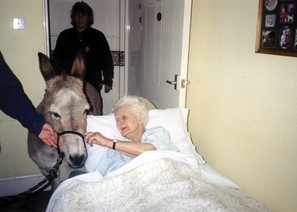Find a Pet Friendly Care Home
| The time may come when an elderly person needs to move into a care home. For many, however, the fear of being separated from their cherished pet may cause many folk to avoid the subject altogether until they have no alternative. And some actually refuse to go at all. Pets are often the one remaining link an older person has with a deceased spouse; in many cases they are the sole reason the owner keeps shopping for food and warming the home. Animals offer companionship and someone to talk to, and they give unconditional love. Take a look at the case studies of pet friendly care homes from SCAS Six tips to finding a care home which takes pets
5. Talk to charities in the know The Cinnamon Trust has been enabling elderly people and their pets to stay together for 25 years. Its Pet Friendly Care Homes Star Rated Guide lists homes taking pets in the UK. The Cinnamon Trust will also send you a printed list of homes taking pets in the area you want. They have a network of volunteers who help the elderly with pet care, either in private or care homes. 6. Be prepared and ready to argue your case SCAS has a very useful page with tips and you can also point home managers in the direction of the page Care Professionals on their site where they can get more info Residents, staff and visitors can all benefit from pets There’s many a home manager who has sent a member of staff having a stressful day to have a quiet few moments and a cuddle with a resident pet. Pets give everyone a safe topic of conversation. They provide moments of merriment and laughter, and act as social catalysts. Pets offer a talking point when grandchildren come to visit. They can also lessen the amount of attention residents want from staff. And the right sort of pet excels at lowering blood pressure and stress levels.
And of course, pets help elderly people to feel needed and wanted, and to avoid the three plagues of care homes, identified by the Eden Alternativeas boredom, loneliness and helplessness. Finding a pet friendly care home is worth the effort
Research by Dr June McNicholas and Dr Glyn Collis showed that elderly people who had been separated from their pets faced more problems than those who had not, as the former group:
The researchers from Warwick University concluded that having visiting animals did not alleviate such personal distress. |
| Strive to uphold the bond between pet and owner
It’s easy to assume that an elderly person and their pet will need to part, when the time comes for the former to move into a home, and that both “will soon get over it”. It doesn’t need to happen. Many homes put themselves out to be pet friendly, as staff understand and appreciate the therapeutic benefits of the animal-human bond and the relationship between elderly person and their pet.
There will lots of information to gather when finding a care home for an elderly relative and it's not an easy ride for many of us. But do your research, and an elderly person and pet could have a good many happy years together, while giving others many magical moments too - and it could mean a relative settles far more quickly and happier if their loving, loyal friend is by their side.
|

